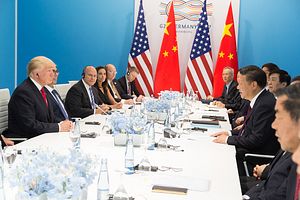The trade disputes between China and the United States are heating up.
The United States recently submitted a document to the World Trade Organization (WTO), stating its opposition to granting China market economy status. Meanwhile, the U.S. Commerce Department has launched “historic” anti-dumping and anti-subsidy investigations into Chinese aluminum. In response, China harshly criticized the U.S. stance.
According to multiple news reports, the United States has formally submitted its 40-page statement of opposition to the WTO as a third-party brief in support of the European Union in a dispute with China. The United States has argued in various occasions that the Chinese government’s “role in the economy and its relationship with markets and the private sector results in fundamental distortions in China’s economy.”
The Wall Street Journal quoted economists’ estimate that being labeled as a non-market economy by the United States and European Union has cost China billions of dollars in exports, because tariffs above 100 percent have been applied to many of China’s products.
It’s also worth noting that the U.S. document was reportedly submitted in Geneva in mid-November — days after U.S. President Donald Trump’s trip to China. During Trump’s three-day visit to Beijing, China signed deals worth $253.4 billion with the United States in an attempt to please Trump and diffuse bilateral tensions on trade. It is obvious now that China’s attempt failed.
In response to the U.S. moves, at the regular press briefing on November 29, Chinese foreign ministry spokesperson Geng Shuang argued that “the concept of the so-called non-market economy can be found in no multilateral WTO rules, since it was created by several countries during the Cold War and only incorporated into domestic laws of a scanty few of the 164 WTO members.”
He further quoted Article 15 of China’s Protocol on the Accession to the WTO, claiming that any “anti-dumping measures against Chinese exports must be terminated on December 11, 2016. ”
“It has nothing to do with whether China meets the so-called standards of market economy status or not,” Geng added. “It is written down in black and white in the Article 15… This is clear-cut and beyond dispute.”
As The Diplomat noted earlier, Beijing has repeatedly contended that China should be regarded as a “market economy” by the end of 2016, because Article 15 of China’s WTO accession agreement says:
Once China has established, under the national law of the importing WTO Member, that it is a market economy, the provisions of subparagraph (a) shall be terminated provided that the importing Member’s national law contains market economy criteria as of the date of accession. In any event, the provisions of subparagraph (a)(ii) shall expire 15 years after the date of accession.
However, many other WTO members claim that the Article is more complicated than China’s simple interpretation and China must demonstrate it is in fact a “market economy” before being recognized as such.
To make matters worse, the U.S. Commerce Department on November 28 launched anti-dumping and anti-subsidy investigations on Chinese aluminum sheet imports — the first U.S. government-initiated trade case in over a quarter century.
“If the Commerce Department preliminarily determines that dumping or unfair subsidization is occurring, then it will instruct U.S. Customs and Border Protection to start collecting cash deposits from all U.S. companies importing the subject aluminum sheet from China,” the U.S. Commerce Department said in its statement.

































